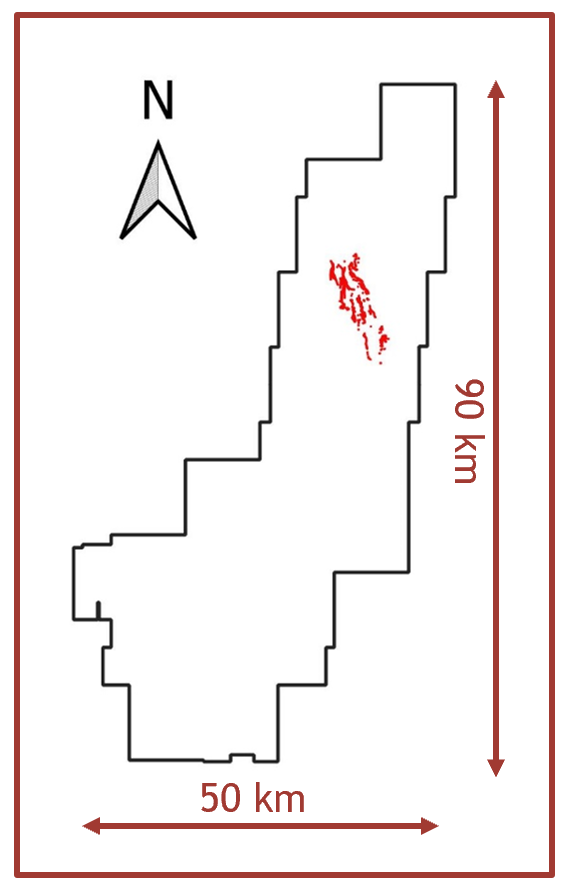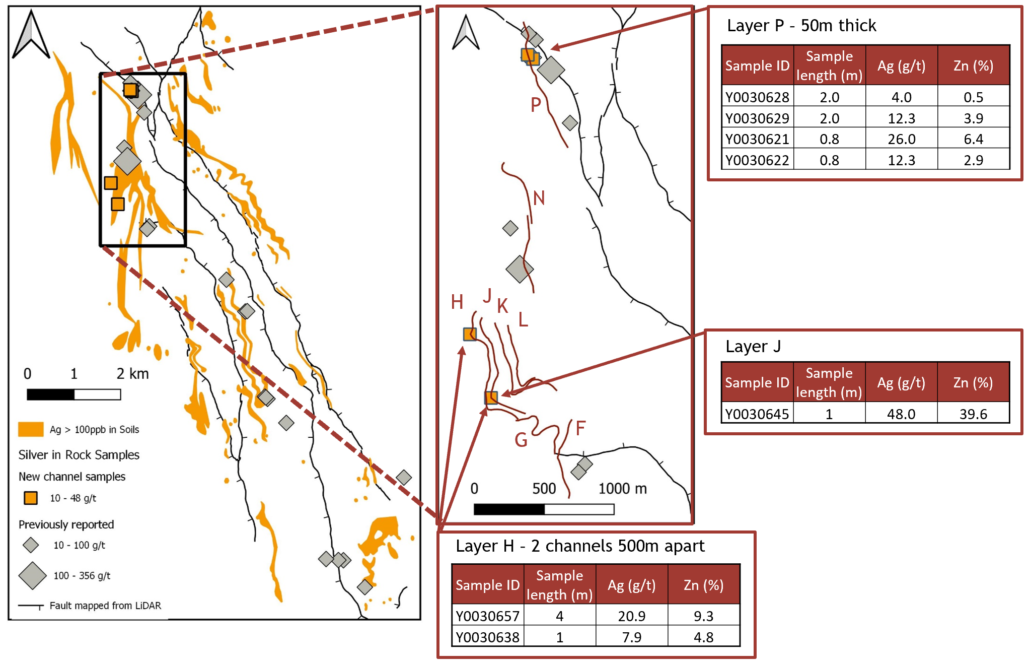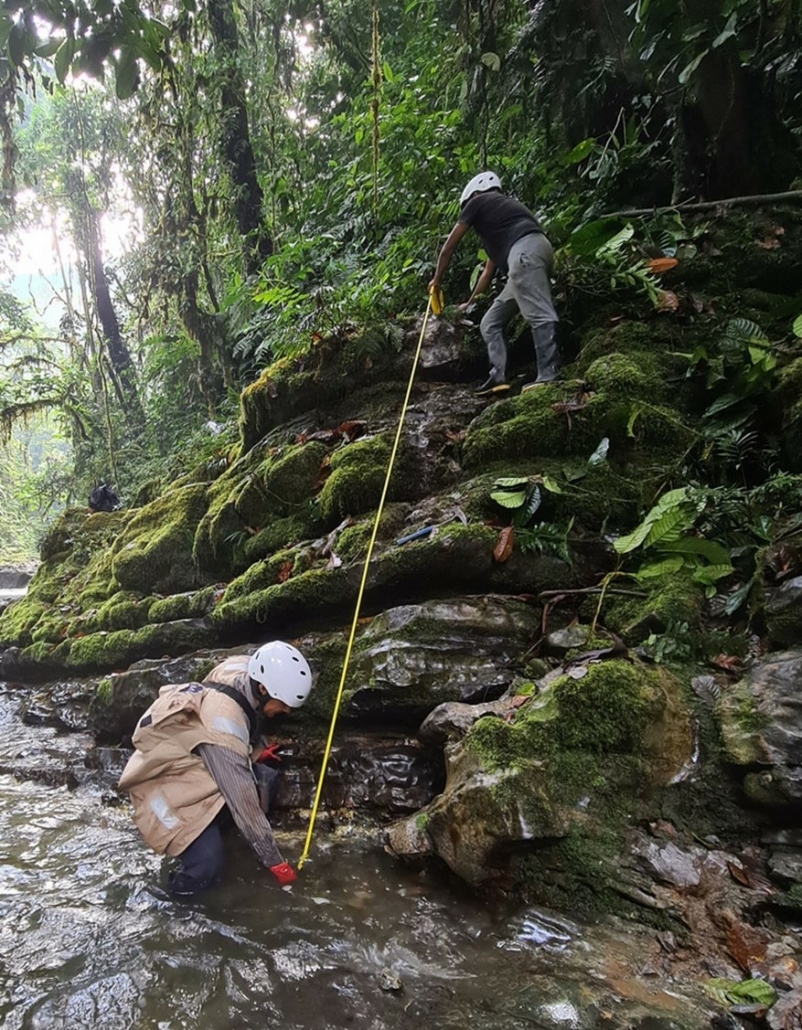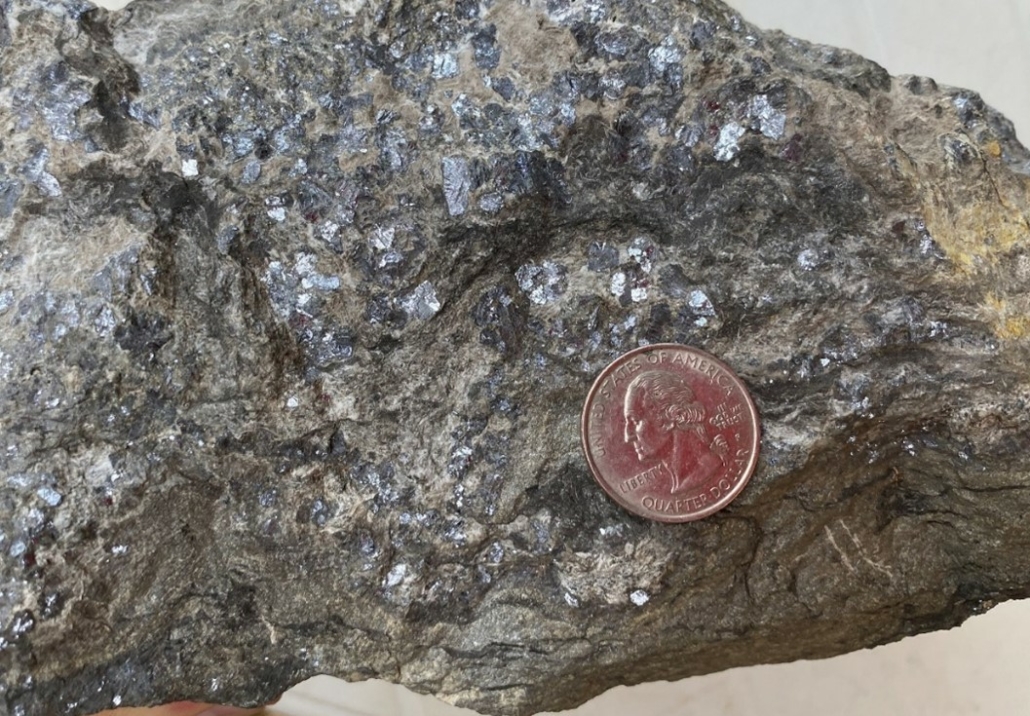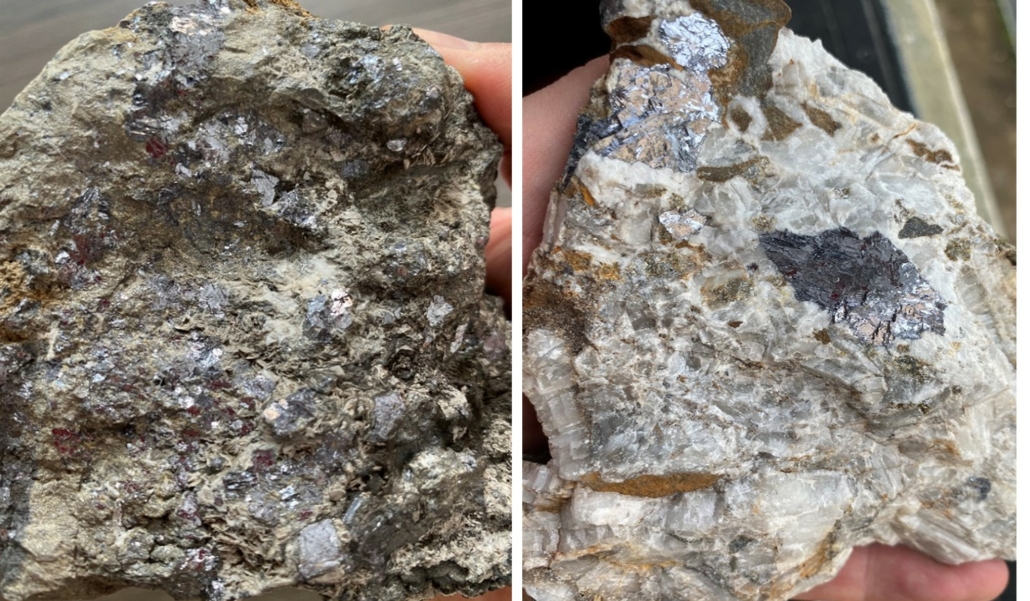Toronto, Ontario, April 12, 2021 – Aurania Resources Ltd. (TSXV: ARU) (OTCQB: AUIAF) (Frankfurt: 20Q) (“Aurania” or the “Company”) reports on its first channel rock-chip sampling from the Tiria-Shimpia silver-zinc zone – a target that is over 15 kilometres (“km”) in length, in the central part of the Company’s Lost Cities – Cutucu Project (“Project”) in southeastern Ecuador.
Seven mineralized layers have been identified, one of which is 50 metres (“m”) thick. So far, the layers have been traced laterally, through intermittent exposures in thick jungle, for between 500m and 1,100m. As can be appreciated, with mineralization of this magnitude it will be some time before the full surface extent is truly known and sampled, however the Company is already making plans to diamond drill several key exposures in the near term.
Aurania’s Chairman & CEO, Dr. Keith Barron commented, “Shareholders will be aware that we have been working on Tiria-Shimpia for some time now. Earliest indications were that we could be dealing with a simple vein system of limited mineral volume. We are now very much aware that we are dealing with a different beast: we have traced it along trend for over 15 kilometres, and we’re starting to demonstrate continuity between one exposure and the next, Tiria-Shimpia is shaping up to be Aurania’s first discovery. While this target is evolving, we are running our concurrent drill programs at Tsenken N1 and Kuri-Yawi, both of which give us exposure to making additional discoveries. The Tiria-Shimpia target now extends across almost the entire width of our concession block as illustrated in Figure 1. Our regional exploration teams are finding further extensions to the mineralized system, and our expectation is that it will grow further.”
Additional soil sampling has expanded the area in which silver and zinc have been found in the Tiria-Shimpia target area by approximately 120% since soil results were last reported in the press release dated February 8, 2021.
Figure 1. Plan view of Tiria-Shimpia target area showing its central location in the Lost Cities – Cutucu concession area. Footprint of silver in soil shown.
Concurrent rock-chip sampling has confirmed that the target contains high-grade mineralization, and the next logical step is to demonstrate continuity of the mineralization by channel sampling outcrops where the bedrock is exposed at surface on the jungle floor. Channel sampling, in which a chisel is used to extract chips of rock from a 10 centimetre (4 inch) wide track over the mineralized rock, provides a representative sample of grade over the width of the observed mineralization.
Mineralization has so far been found in seven layers of limestone and dolomite that are interlayered with sandstone. Highlights, shown in Figure 2, are:
- Unit P: mineralization has been observed over a true thickness of approximately 50m and extends at least 1km along trend. Intensely mineralized layers within the dolomite were channel sampled, returning grades of 2m at 12g/t silver and 3.9% zinc and 0.8m of 26g/t silver and 6.4% zinc.
- Unit H: has been sampled in two channel samples spaced 500m apart along its length of 1km, that returned grades of 4m at 21g/t silver and 9.3% zinc, and 1m at 8g/t silver and 4.8% zinc.
- Unit J: has been traced 900m along trend with the one channel sample taken, returning a grade of 48g/t silver and 39.6% zinc.
- Unit N: has been traced 1.1km along trend and a grab sample from outcrop had a grade of 199g/t silver with 22% zinc and 13% lead (see press release dated September 25, 2020).
Figure 2. a. Plan view of silver distribution in soil at Tiria-Shimpia. This shows where the mineralized layers or sheets come to surface along the edge of the mountains. b. Provides detail of part of the system. The brown lines show where the mineralized layers come to surface. These sheets extend westwards (to the left) under the mountain. The tables show the silver and zinc grades of samples, the location of which is shown in b. The samples for which a sample length is given are channel samples.
Scout Drilling
- Tiria-Shimpia: Some drill sites have already been selected and others will be based on the distribution of grade in the mineralized sheets as defined by the channel sampling, which will be done as systematically as the scattered outcrop allows. While this detailed sampling is being done, other exploration teams are sampling soil to identify further areas of metal enrichment and others are exploring adjacent areas for possible further extensions to the Tiria-Shimpia mineralized system.
- Tsenken N1: The first drill hole at Tsenken N1 has been completed to a depth of 722 meters and assay results are awaited.
- Kuri-Yawi: Drilling at Kuri-Yawi is underway with a second rig that can drill to approximately 1,200 metres.
Geological Details of the Area Sampled at Tiria-Shimpia
Mineralization is massive sphalerite and galena, occurring with strontian barite and pyrite/marcasite in dolomitic strata. The exposures have been leached and weathered, which is identified by radiating masses of cerussite (lead carbonate) on the surface of outcrops. Therefore, assay results from initial rock-chip sampling may understate underlying metal content. Several MobileMT lines were run over the zones during the airborne geophysical survey and anomalies appear to be correlated with surface exposures of mineralized layers.
The channel sample results reported in this press release are in the north-central part of the Tiria-Shimpia target area (Figure 2a). Units F and H, the uppermost mineralized layers, lie at the contact between sandstone and dolomite, and units J, K, L and N are mineralized dolomite layers within sandstone.
Figure 3. Field teams measuring the true width of mineralized layers exposed in the bank of a stream.
Figure 4. Massive sphalerite (fine-grained, brown) and galena (gray metallic) from the core of one of the high-grade layers of mineralization at Tiria-Shimpia.
Figure 5. Left: Galena with radiating masses of cerussite. Right: Clots of galena within barite-celestite.
Sample Analysis & Quality Assurance / Quality Control (“QAQC”)
Laboratories: The soil samples were prepared for analysis at MS Analytical (“MSA”) in Cuenca, Ecuador, and the analyses were done in Vancouver, Canada.
Sample preparation: The rock samples were jaw-crushed to 10 mesh (crushed material passes through a mesh with apertures of 2 millimetres (“mm”)), from which a one-kilogram sub-sample was taken. The sub-sample was crushed to a grain size of 0.075mm and a 200 gram (“g”) split was set aside for analysis.
Analytical procedure: Approximately 0.25g of rock pulp underwent four-acid digestion and analysis for 48 elements by ICP-MS. For the over-limit samples, those that had a grade of greater than 1% zinc and lead, and 100g/t silver, 0.4 grams of pulp underwent digestion in four acids and the resulting liquid was diluted and analyzed by ICP-MS.
QAQC: Aurania personnel inserted a certified standard pulp sample, alternating with a field blank, at approximate 20 sample intervals in all sample batches. Aurania’s analysis of results from its independent QAQC samples showed the batches reported on above, lie within acceptable limits. In addition, the labs reported that the analyses had passed their internal QAQC tests.
Qualified Person
The geological information contained in this news release has been verified and approved by Jean-Paul Pallier, MSc. Mr. Pallier is a designated EurGeol by the European Federation of Geologists and a Qualified Person as defined by National Instrument 43-101, Standards of Disclosure for Mineral Projects of the Canadian Securities Administrators.
About Aurania
Aurania is a mineral exploration company engaged in the identification, evaluation, acquisition and exploration of mineral property interests, with a focus on precious metals and copper in South America. Its flagship asset, The Lost Cities – Cutucu Project, is located in the Jurassic Metallogenic Belt in the eastern foothills of the Andes mountain range of southeastern Ecuador.
Information on Aurania and technical reports are available at www.aurania.com and www.sedar.com, as well as on Facebook at https://www.facebook.com/auranialtd/, Twitter at https://twitter.com/auranialtd, and LinkedIn at https://www.linkedin.com/company/aurania-resources-ltd-.
For further information, please contact:
| Carolyn Muir
VP Investor Relations Aurania Resources Ltd. (416) 367-3200 |
Dr. Richard Spencer
President Aurania Resources Ltd. (416) 367-3200 |
Neither the TSX Venture Exchange nor its Regulation Services Provider (as that term is defined in the policies of the TSX Venture Exchange) accepts responsibility for the adequacy or accuracy of this release.
Forward-Looking Statements
This news release may contain forward-looking information that involves substantial known and unknown risks and uncertainties, most of which are beyond the control of Aurania. Forward-looking statements include estimates and statements that describe Aurania’s future plans, objectives or goals, including words to the effect that Aurania or its management expects a stated condition or result to occur. Forward-looking statements may be identified by such terms as “believes”, “anticipates”, “expects”, “estimates”, “may”, “could”, “would”, “will”, or “plan”. Since forward-looking statements are based on assumptions and address future events and conditions, by their very nature they involve inherent risks and uncertainties. Although these statements are based on information currently available to Aurania, Aurania provides no assurance that actual results will meet management’s expectations. Risks, uncertainties and other factors involved with forward-looking information could cause actual events, results, performance, prospects and opportunities to differ materially from those expressed or implied by such forward-looking information. Forward looking information in this news release includes, but is not limited to Aurania’s objectives, goals or future plans, statements, exploration results, potential mineralization, the corporation’s portfolio, treasury, management team and enhanced capital markets profile, the estimation of mineral resources, exploration, timing of the commencement of operations and estimates of market conditions. Factors that could cause actual results to differ materially from such forward-looking information include, but are not limited to, failure to identify mineral resources, failure to convert estimated mineral resources to reserves, the inability to complete a feasibility study which recommends a production decision, the preliminary nature of metallurgical test results, delays in obtaining or failures to obtain required governmental, regulatory, environmental or other project approvals, political risks, inability to fulfill the duty to accommodate indigenous peoples, uncertainties relating to the availability and costs of financing needed in the future, changes in equity markets, inflation, changes in exchange rates, fluctuations in commodity prices, delays in the development of projects, capital and operating costs varying significantly from estimates and the other risks involved in the mineral exploration and development industry, the effects of COVID-19 on the business of the Company including but not limited to the effects of COVID-19 on the price of commodities, capital market conditions, restrictions on labour and international travel and supply chains, and those risks set out in Aurania’s public documents filed on SEDAR. Although Aurania believes that the assumptions and factors used in preparing the forward-looking information in this news release are reasonable, undue reliance should not be placed on such information, which only applies as of the date of this news release, and no assurance can be given that such events will occur in the disclosed time frames or at all. Aurania disclaims any intention or obligation to update or revise any forward-looking information, whether as a result of new information, future events or otherwise, other than as required by law.




